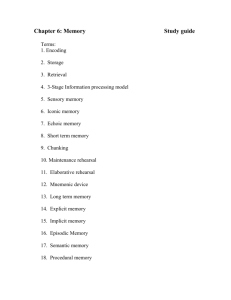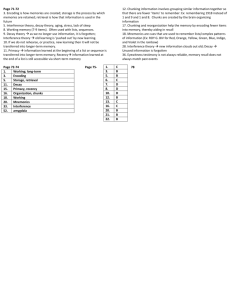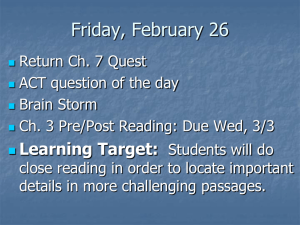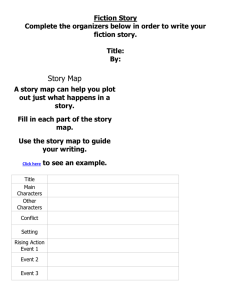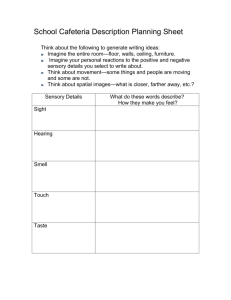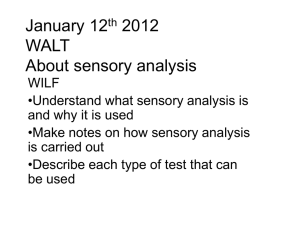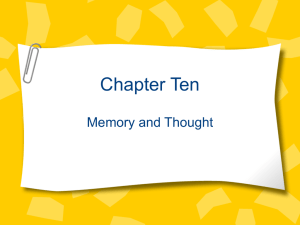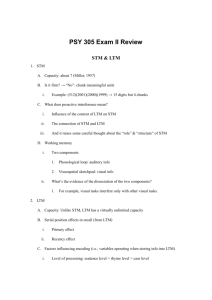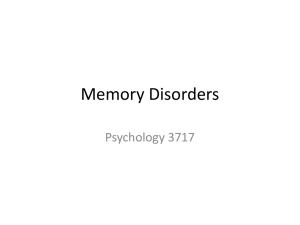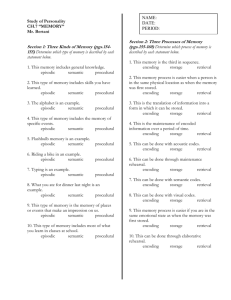Introduction to Psychology
advertisement
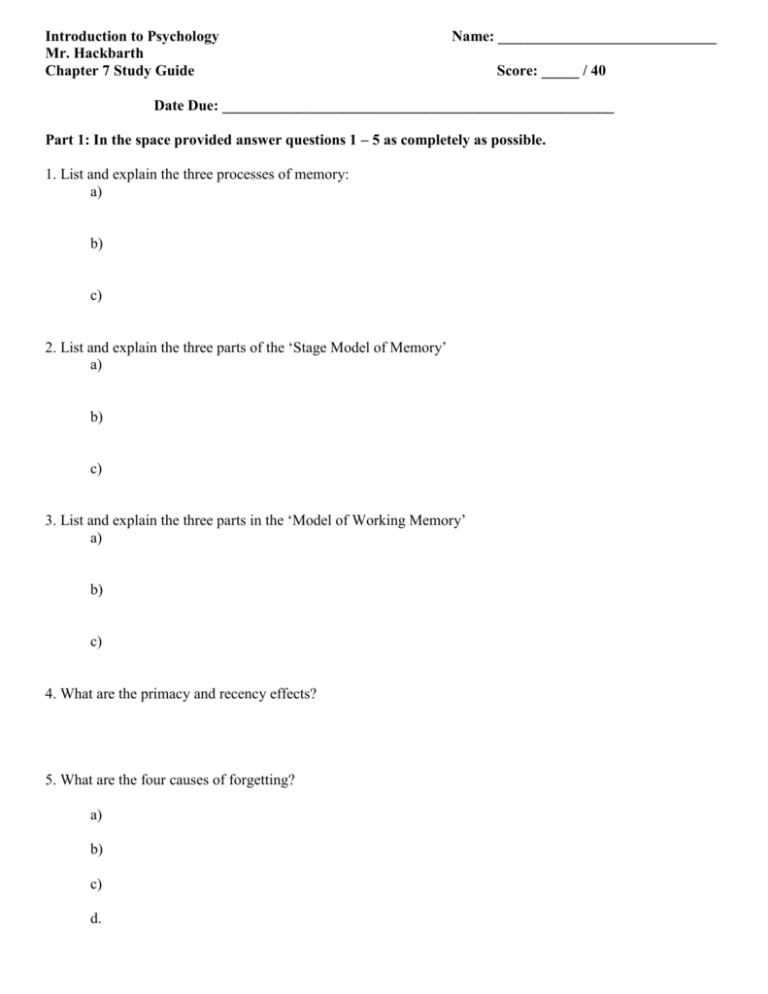
Introduction to Psychology Mr. Hackbarth Chapter 7 Study Guide Name: _____________________________ Score: _____ / 40 Date Due: ____________________________________________________ Part 1: In the space provided answer questions 1 – 5 as completely as possible. 1. List and explain the three processes of memory: a) b) c) 2. List and explain the three parts of the ‘Stage Model of Memory’ a) b) c) 3. List and explain the three parts in the ‘Model of Working Memory’ a) b) c) 4. What are the primacy and recency effects? 5. What are the four causes of forgetting? a) b) c) d. Part 2: Matching: In the space provided, write term identified by each description. Choose your answers from the word bank. explicit memory procedural memory positive transfer context dependent memory recall repression WORD BANK chunking sensory memory encoding retroactive interference decay semantic memory interference suppression echoic memory proactive interference short – term memory episodic memory 1. The fading away of memory: ______________________________________ 2. Organization of items into familiar or manageable units: __________________________________ 3. The immediate, initial recording of sensory information into the memory system: ______________________ 4. People remember and retrieve memories better when they are in the same place where they first stored the memory: ______________________________________ 5. Sensory register that remembers ‘echoes’ or sounds: __________________________________ 6. The memory of facts and experiences that one can consciously know and declare: ______________________ 7. The ability to retrieve learned information and reconstruct it in your mind: ________________________ 8. The learning of some items that interfere with the retrieval of other information: _______________________ 9. The process by which old information facilitates or helps our learning of new information: _______________ 10. The processing of information to the memory system: __________________________ 11. When old learning interferes with new learning: ______________________________________ 12. The deliberate and conscious effort to forget information: ____________________________________ 13. Our form of memory that is considered your ‘working memory’: _______________________________ 14. The type of memory within our long – term memory that contains learned skills and procedures that we don’t know the exact time that we learned the skill: _________________________________________ Part 3: Multiple Choice: Write the letter of the best selection given for each question or statement on the given blank. 1. _____ What is the memory process that locates stored information and returns it to consciousness? a. retrieval b. storage c. encoding d. interference 2. _____ Sad feelings that trigger memories of another sad time are an example of a. state – dependent memory b. context – dependent memory c. echoic memory d. sensory memory 3. _____ The process of putting incoming information into a form with which the memory system can work is called a. storage b. retrieval c. encoding d. processing 4. _____ An example of improving memory through mechanical repetition is a. writing and rewriting items b. constructing links c. forming unusual associations d. creating mnemonic devices 5. _____ Even though Samantha cannot explain how she is able to wiggle her nose, she always remembers how to do it. Samantha’s memory for her nose wiggling is an example of ___________ memory a. procedural b. episodic c. semantic d. short – term 6. _____ Most people forget things because of the normal processes of a. maintenance and elaborative rehersals b. interference and decay c. repression and amnesia d. chunking and schema 7. _____ You give your friend instructions about what to buy for a party by quickly rattling off 15 unrelated grocery store items. Then to check whether your friend got all the information, you ask him to repeat the grocery list back to you. You should expect that your friend will recall about _______________ items. a. 2 b. 7 c. 12 d. 15 8. _____ Julie has just met Jim, and though there is nothing overtly annoying about him, Julie feels a certain inexplicable dislike for him. Although she is unaware of it, Julie was treated badly by someone who looked like Jim when she was younger. What type of memory is involved in this situation? a. semantic b. implicit c. explicit d. procedural 9. _____ Elise can only remember the phone number she just looked up in the phone book by repeating it over and over. When she stops saying it out loud, she forgets it. Elise is using ___________ rehearsal to keep the information in _____________________memory. a. maintenance; short – term b. maintenance; sensory c. elaborative; short – term d. elaborative; long – term 10. _____ Jolene deals daily with students asking for information regarding the status of their student loans. Now that she is experienced, she is able to hold a student’s social security number in her memory for the 10 to 20 minutes she is dealing with each one. She does so by associating small groups of the numbers with a special date or fact. This is called a. mnemonic device b. chunking c. implicit memory d. explicit memory 11. _____ Marco was presented with a long list of words. He was then asked to try to remember as many as he could. If he remembers the last word, he experienced a ____________________ effect, which supports the existence of __________________ memory. a. primacy; long – term b. recency; long – term c. primacy; short – term d. recency; short – term 12. _____ Al is on the witness stand of a trial. He is asked if he can remember the name of the person who told him to place the bet. Al replies that he things the last name of the person starts with a “C”. Al’s response is an example of a. decay b. feeling of knowing experience c. spontaneous generalization d. tip of the tongue phenomenon 13. _____ Edward is working on his taxes. Unfortunately, he can’t remember the new tax laws, since his brain seems to be filled with the old tax laws. Edward is experiencing ______________ interference. a. anterograde b. retroactive c. retention d. proactive 14. _____ You are driving down the street when you see a billboard displaying a phone number for a service you need. You keep repeating the number over and over so you won’t forget it until you get home, where you can write it down. You do this to prevent the process of __________ from causing you to forget the number a. decay b. construction c. proactive interference d. retroactive interference 15. _____ Roberto decided to study for his psychology exam in the room where the test was going to be given. He was counting on ________________________ to help him get a good grade. a. context – dependent memory b. spreading activation c. state – dependent memory d. the recency effect 16. _____ Tami lights a sparkler and hands it to her young son, Jacob. She tells Jacob to write his name in the air with the sparkler. She can see this “writing” because the light from the sparkler is briefly held in her _______________________ memory. a. sensory b. working c. long – term d. episodic 17. _____ The variable that largely determines whether information is moved from the sensory registers to short – term memory is a. spreading activation b. rehearsal c. chunking d. selective attention 18. _____ Remembering what the word ‘summer’ means requires _______________ memory, while remembering what you did on July 4th last summer requires ________________ memory. a. episodic; semantic b. episodic; procedural c. semantic; episodic d. semantic; procedural 19. _____ Jasmine memorized a list of state capitals for his geography exam. Once he had done so they became _______________ memories. a. implicit b. episodic c. semantic d. sensory 20. _____ On average, information is retained in sensory memory for ____________ seconds. a. sixty b. less than two c. twenty d. thirty 21. _____ Al is on the witness stand during a criminal trial. He is asked if he can remember the name of the person who told him to place the illegal bet. Al replies that he thinks the last name of the person starts with “C”. Al’s response is an example of a. feeling-of-knowing experience b. spontaneous generalization c. decay d. tip-of-the-tongue phenomenon
